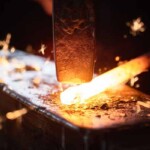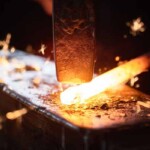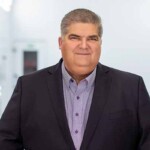
Forging a Path to the Future Through Specialization
Published in New England Automotive Report – Thomas Greco Publishing
Navigating the rapidly advancing technology of the collision repair industry has created many challenges for shops as they struggle to keep pace with all the changes happening on what seems like a daily basis.
 These days, properly repairing vehicles requires investing in specific tools, equipment and training – all of which vary drastically depending on the vehicle make and model.
These days, properly repairing vehicles requires investing in specific tools, equipment and training – all of which vary drastically depending on the vehicle make and model.
It can be difficult to see the forest for the trees, but technology truly presents some amazing opportunities for those who are willing to take a step back and embrace some different ways of proceeding. The path forward may look different than previously imagined, and many industry professionals believe the map to a successful future circles around the concept of specialization. Because modern vehicles are so complex, many shops recognize the benefits of obtaining certifications from specific OEMs instead of trying to repair everything that comes in their doors, thus working with advancing technology instead of working against it.
What exactly does it mean to specialize? The Merriam-Webster dictionary primarily defines specialization as “to concentrate one’s efforts in a special activity, field or practice,” but an alternate meaning makes even more sense when talking about specialization in the collision industry: “to change adaptively.” After all, that’s precisely what shops need to do to stay at the forefront of the field these days – change and adapt in keeping with the technology that constantly does the same.
Change is never easy, but as shops around the country adapt to the reality that repairing every vehicle make and model may not be feasible, many see specialization as the path to future success.
“We need to look at it like we are the doctors for the vehicles; doctors specialize,” suggests AASP/MA Executive Director Lucky Papageorg. “We cannot be all things to all people – if shops try to be everything to every car out there, they are shooting themselves in the foot. Specializing results in a higher ROI, plus it helps with workflow and cycle time since the shop’s technicians become more familiar with specific makes and models.”
According to the New England Automotive Report 2023 Industry Survey, 38 percent of Massachusetts shops were already certified by at least one OEM, while 18 percent of respondents indicated that they were working toward certification. The benefits of OEM certification vary from shop to shop, but nearly 70 percent of shops indicated that enhanced access to OEM procedures and a positive impact on the shop’s reputation are the main draws for maintaining certification.
Additional incentives include access to OEM training, direct marketing through the OEM and better access to OEM parts, as well as increased workflow and revenue. “The differentiation of being certified supports our labor rate and justifies a co-pay,” according to one shop. Shops mentioned 17 distinct manufacturers for which they’ve received the necessary training, tools and equipment to achieve their certification; certified shops held 4.7 certifications on average.
“You cannot repair enough cars to see a return on investment if you have 13 certifications,” Papageorg points out, recommending shops “focus on certain brands based on your area’s market conditions. When you’re working on similar lines the majority of the time, it improves efficiencies within the shop.”
Josh Fuller (Fuller’s Collision Center; Auburn) agrees. “Our focus is on the top five or six manufacturers in our market, which is a combination of foreign and domestic vehicles. That’s what we specialize in. Can we repair others? Of course. We’ll triage the loss to see if it’s within our realm of experience. We’ve definitely concentrated a lot on EV technology as well. It’s important to be aware of all the requirements when repairing electric vehicles; if we’re certified in a manufacturer that offers a separate EV certification, we want to be certified to fix their EVs as well.”
In addition to increased productivity borne of higher efficiency, Fuller believes one of the main benefits of specialization is “a greater depth of knowledge of the vehicle. While you can see the primary damage easily enough, collision repairers who specialize in certain makes and models have an edge on determining any secondary damage; because they’re more likely to have seen a similar scenario, they have a better understanding of what other components may have been affected by the energy transfer.
“The potential drawback to that knowledge is that we’re moving toward a workforce that may be less diverse in repair procedures because they’re focusing solely on a few specific OEs,” he acknowledges, observing, “There’s a continuous change in vehicle engineering which also impacts loss circumstances, such as how fast a vehicle was going, how it was operating and whether it was under the driver’s control or if the loss was mitigated due to an ADAS feature taking over. We’re seeing different types of losses, which are often less severe, yet the damage is becoming more complicated to repair because of all the technical components on modern vehicles.”
Specialization also leads to brand loyalty, according to Rob DelGallo (Factory Collision & Restoration; Weymouth), whose I-CAR Gold shop is certified in Ford, Ford aluminum, Lincoln, Honda/Acura and GM. “A benefit of specialization is the loyalty of consumers who care about their vehicles and plan on keeping them once the loan is paid off, and they cannot be easily steered away from us because of past work we have performed on previous vehicles.”
A drawback that DelGallo has seen is continued steering by insurers “due to sticking to OUR repair plan and our hourly door rate, which is higher than the rate the insurers pay to their servant shops. They use the line, ‘You will have to pay out of pocket if you use that shop,’ which is true, but I cannot pay my techs a living wage based on the rate of compensation from insurers and will not rely on any politician to rectify the out-of-whack labor rates paid to our profession. I’ve been involved in that battle for as long as I can remember; the legislature has no place in setting any industry’s rate of compensation.
“I blame the servant shops and weak back-boned shops for allowing the insurers to use the cheapest price available,” he continues. “Those on lists seem to feel it’s acceptable to lose a little on each job if they make it up in volume. I see a lot of similarities in our trade to the doctor shortage we are experiencing. Good doctors are getting out of private practices and moving toward consolidation due to the rising cost of the administrative side of working for insurance companies, plus having to fight to get paid! Sound familiar?”
Tom Ricci (Body and Paint Center; Hudson) believes that the amount of education needed to be OE certified is a benefit in and of itself. “We had to push to become I-CAR Gold Class before getting certified in GM, Ford, Chrysler, Honda/Acura, Nissan, Subaru, Kia, Genesis and Mazda. In addition to taking a lot of I-CAR courses, we had to ramp up our tooling and training to achieve those certifications. Our techs embrace the training as a way to evolve and stay up-to-date with the technology being released. On the flip side, the cost of getting certified by 10 OEs has certainly added to our overall expenses.”
“Specialization requires an investment in training and equipment,” Fuller inputs. “In order to qualify that investment, it’s important to establish a true ROI before investing in a specific certification or the ability to repair certain vehicles. You need to determine that you’re going to get that return on your investment, whether it’s the cost of certification or the cost of training.”
“The expenses for these certifications is turning out to be a money grab for the smaller shops,” DelGallo laments. “The prices have been going up, and the perks are less. We used to get access to the info from those manufacturers, but now, it is an added cost to high participation fees in return for next to nothing from them. The equipment is very expensive, the training is expensive, and the I-CAR experience is expensive and ludicrous. We have to deal with platinum individuals from insurers who couldn’t care less about following I-CAR recommended procedures. We’ve been told we over-repair cars, meaning [we insist on] no tape lines in jams, only OEM parts and detailed operations prescribed by I-CAR and the manufacturers.”
Despite the battle with insurers for reimbursement, DelGallo sleeps better at night knowing that his shop is doing what’s right for his clients. “We can show our customers cars we have received from the insurers program shops and the unbelievable hacking and omitting of parts they were probably sending back for credit.
“Some clients get the value in our approach to training and repairs and are very loyal,” he continues. “They will send referrals based on our reputation and longevity of being in business. Others are only interested in how fast and how cheap we can repair their vehicle, so we do not entertain them. They’re not interested in understanding the educational differences between us and other shops, and repairing that one vehicle is not worth jeopardizing our reputation.”
Ricci concurs that it’s important to educate customers. “We have a discussion and inform them that before getting OE-certified, we had to first become an I-CAR Gold Class shop, and only 10 percent of US shops have invested the time and energy into becoming tooled and trained to be able to repair vehicles to this level.”
Fuller also insists on the value of educating consumers, part of which requires a consistent marketing message. “It’s about how we talk about our brand. We’ve created a certain framework that’s consistent, regardless of the platform, so each message fits and is appropriately similar across all marketing mediums,” he notes. “We explain what a certification is and how it differentiates us from other shops. It means we’ve chosen to invest in our people and the equipment. It’s a mindset because you don’t know what you don’t know. Becoming certified means being committed to research, pulling OEM repair procedures and really creating a true repair plan with documentation, which is vital to the repair.”
Customers aren’t the only ones who require education on the value provided by certification, though. “It’s also about educating the insurance company,” Fuller insists. “They don’t fix cars; they pay for the repairs to the vehicle, yet we have to explain those repairs to them and educate them with documentation, post-repair scans and additional paperwork in order to maintain complete transparency. Both the repair and claims processes have gotten more complex. There’s an increased amount of variables that now come into play and have to be properly vetted in order to have a true understanding of the accurate and appropriate repair plan and process.”
“Insurers do not care [about certification] and will gladly pay our dismantle and removal fees to bring a vehicle to another shop,” DelGallo shares. “That shows the client that insurers only want to control the whole process as the fees usually are higher than the cost difference. They pay those fees instead of letting us repair, but sometimes we get to re-repair when the customers are unhappy and aware their car was butchered. We have to get several supplemental inspections, and although the appraisers know what’s going on, they have to do the dirty work for a paycheck. A lot of them are sick and tired of the BS. Some even admit they do not know what they are looking at when we tell them about weld stress tests; they will pay but have no idea what we are talking about. A lot of them used to be mediocre body guys, and now they work for insurers.”
For Ricci, specialization has not dramatically changed the repair or claims processes, though he acknowledges “added challenges to get required procedures completed and paid for.”
Fortunately, those challenges are becoming worth the trouble as more customers are taking their vehicles to shops listed on the manufacturers’ website, according to Ricci, who also emphasizes the need for certified shops to market the expertise of their business to attract these savvy customers. “We didn’t see a lot of traction in the first two years, but over the last couple years, we have seen an increase in customers who came to the shop because we are certified, and we’ve been marketing our shop that way.”
Profitability is always a challenge in this industry of suppressed labor reimbursement rates, and DelGallo stresses, “Profits are down on insurance-based work due to paying our techs what the insurers normally pay per billable hour. But we also specialize in classic and antique/specialty vehicles. My techs have been with me for many years, and it’s very difficult to find quality minded techs, plus they are aging out. We have been a restoration shop since we started, and quite frankly, when a vehicle is involved in an accident, we must restore the many systems of ADAS that are installed in today’s vehicles, along with energy management We want an invisible repair, and that’s what insureds are due: a pre-loss condition. We’re booked out for over a year for restoration work, and we do a fair amount of service and small repairs to these vehicles, which also get into accidents. Because there aren’t many classic car repair shops, we can charge a fair rate and get very little, if any, pushback.”
Fuller believes that specialization has positively impacted his shop’s sustainability. “The commitment to training really helps to grow our people by supporting continuous improvement. You can’t operate a facility without looking to become more productive, which only comes with training and knowledge. Those core values help to create and sustain a positive, forward thinking culture. And that type of culture helps us attract and retain the next generation of technicians entering the workforce.”
If these experiences have your shop leaning toward specialization, you may be wondering what else you need to consider.
Ricci offers some advice: “If you want to be your best, do it! There are added expenses, but the additional education is invaluable. Even with all these certifications, we recognize that we cannot do everything. We turned a customer away just today; he brought in a high-end aluminum vehicle with very minor damage, and I mentioned that we would be doing a disservice to him to take the car in due to not being certified in this manufacturer. We are no longer concerned about losing a job. It’s more important to make sure we’re doing each job the right way because we have the appropriate training to do so.”
“Specialization is good if you are aligned with a dealer who can feed you the cars of your specialization; however, there is a strange connection with service managers and their buddy shops, which creates almost a pay-to-play scenario,” DelGallo warns. “I recommend specializing in quality, and that will get you through. You may not be rich but you never have to look back [over your shoulder for fear of a bad repair coming back to haunt you]. My crew takes great pride in a job well done, and we have many awards from different types of shows for various makes and years because we take pride in the job and always strive for quality.”
Fuller adds a few thoughts. “As a numbers person, I know it’s important to hone in on ROI and consider how fast you can recuperate your investment, but you also need to think about how that certification fits within your corporation’s framework. What’s your established mission and core values? Does investing in these certifications fit in with what you’re trying to drive in your culture?
“Your team has to be open to training and willing to invest in themselves,” he stresses. “Anyone can attend training, but not everyone is going to get the same out of it. They need to buy in and be willing to actually implement change. No one likes change, but it’s coming faster and faster. It’s actually an exciting time in our industry. There are definitely challenges with the trends toward enhanced technology, but those same advancements create a greater demand for knowledge and a more productive workflow that can really benefit your shop if you’re moving in the right direction.”




